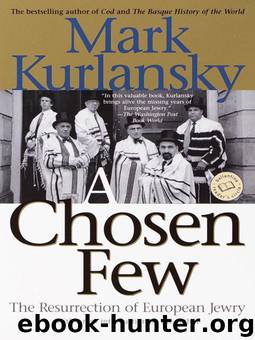A Chosen Few by Mark Kurlansky

Author:Mark Kurlansky
Language: eng
Format: mobi, epub
Tags: History
ISBN: 9780201489361
Publisher: Perseus Books
Published: 1995-01-02T00:00:00+00:00
19
Czechoslovakian
Summer
THE EVENTS OF 1968, FOR A FEW EXCITING MONTHS, caused the name of Victory Street in Brno to be changed once again back to Masaryk Street.
The Czechoslovakian economy, which was supposed to be the best in the Soviet bloc, had been failing. Economic reform was halfhearted and unsuccessful, and in search of change the conservative leadership was removed and the party put in the hands of Slovak party chief Alexander Dubcek. In a quip borrowed from Bertolt Brecht after the 1953 GDR uprising, the new party leader said, “We couldn't change the people, so we changed the leaders.” Dubcek was a courageous man whose destiny it was not to be thanked by history. He was a Communist who tried to save Communism in a country where the ideology had once been broadly popular. Taking a slogan from Hungary in 1956, he called for “Communism with a human face.” The mistakes of the Hungarian movement were not repeated. There was no demand for an independent foreign policy, but instead, Dubcek gave repeated assurances that Czechoslovakia was a loyal member of the Soviet bloc and a firm participant in the Warsaw Pact. Dubcek even made clear that he wanted to continue one-party Communist rule. In the end, the results were no different than in Hungary. Communism may have been capable of a human face, but Soviet power wasn't.
Dubcek offered a Communism that might have taken hold with Czechs and perhaps East Germans and Hungarians and possibly even with Poles. That was what the Soviets feared. Dubcek seriously pursued things that in the past had only been proclaimed in speeches, such as economic reform based on decentralization, de-stalinization to remove the infamous monsters from the power structure, and liberalization, which included free speech, a critical and uncensored press, and freedom to travel abroad.
For the few thousand Jews who were left in Czechoslovakia, Dubcek was a reprieve. The exact number of Jews is uncertain, because after the Slansky trial in 1952 the majority of Jews who stayed did not openly show their Jewishness. The fifteen thousand Prague Jews who were registered with the official Jewish Community were thought to constitute only a third of the Jews in Prague. “Anti-Zionist” persecution had considerably eased since the years immediately after the Slansky trial, but after the Six-Day War, the press once again felt moved to run a steady diet of anti-Zionist opinion. “Spontaneous” anti-Zionist demonstrations were organized. Jewish Community plans for a celebration of one thousand years of Prague Jewry were canceled.
The politically astute saw that the anti-Zionist campaign was simply a desperate attempt by the ruling conservatives to outma-neuver Dubcek and his emerging reformers. Most Jews were not aware of this. They only knew that words like cosmopolitans and Zionists were showing up in the newspapers. But once Dubcek gained control, everything changed. Foreign travel, religious activities, and open criticism of government policies were suddenly commonplace. People who had never been political in their lives were drawn in by the excitement. Karol Wassermann, who had
Download
This site does not store any files on its server. We only index and link to content provided by other sites. Please contact the content providers to delete copyright contents if any and email us, we'll remove relevant links or contents immediately.
Nutrition for Sport, Exercise, and Health by Spano Marie & Kruskall Laura & Thomas D. Travis(3238)
Nutrition for Sport, Exercise, and Health by Marie Spano & Laura Kruskall & D. Travis Thomas(3236)
The Sprouting Book by Ann Wigmore(3056)
Flavor Flours by Alice Medrich(2345)
Memory Rescue by Daniel G. Amen(1964)
Superfood Smoothie Bowls: Delicious, Satisfying, Protein-Packed Blends that Boost Energy and Burn Fat by Chace Daniella(1913)
The Bad Food Bible by Aaron Carroll(1892)
Dirty Genes by Ben Lynch(1859)
Genius Foods by Max Lugavere(1703)
The Main Street Vegan Academy Cookbook by Victoria Moran(1702)
The Poisoner's Handbook by Deborah Blum(1665)
Good Calories, Bad Calories by Gary Taubes(1660)
The I Quit Sugar Cookbook by Sarah Wilson(1628)
Core Performance Essentials by Mark Verstegen(1622)
Memory Rescue: Supercharge Your Brain, Reverse Memory Loss, and Remember What Matters Most by Amen Dr. Daniel G(1572)
Big Girls Do It Stronger by Jasinda Wilder(1569)
Android App Development by Franceschi Hervé J.;(1499)
Sugar Crush by Dr. Richard Jacoby(1466)
Dr. Colbert's Keto Zone Diet by Don Colbert(1321)
